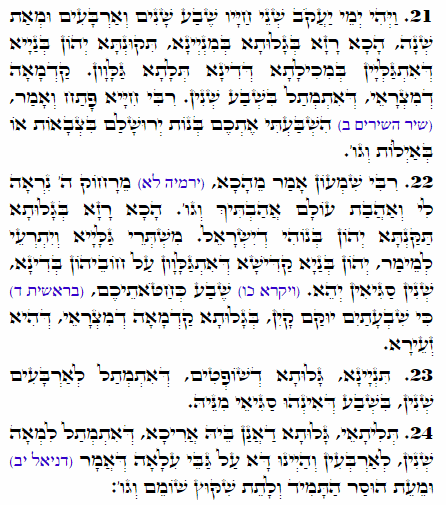Daily Zohar # 2002 – Vayechi – Waiting for the love of God

.
Hebrew translation:
22. רַבִּי שִׁמְעוֹן אָמַר, מִכָּאן (ירמיה לא) מֵרָחוֹק ה’ נִרְאָה לִי וְאַהֲבַת עוֹלָם אֲהַבְתִּיךְ וְגוֹ’. כָּאן סוֹד הַגָּלוּת, הַתַּקָּנָה שֶׁיִּהְיוּ בְּנֵי יִשְׂרָאֵל מְשֻׁחְרָרִים מִגָּלֻיּוֹת, וְיִתְרַצֶּה לוֹמַר שֶׁיִּהְיוּ הַבָּנִים הַקְּדוֹשִׁים, שֶׁהֻגְלוּ עַל חֲטָאֵיהֶם בְּדִין, שָׁנִים רַבּוֹת יִהְיֶה, (ויקרא כו) שֶׁבַע כְּחַטֹּאתֵיכֶם, (בראשית ד) כִּי שִׁבְעָתַיִם יֻקַּם קָיִן, בַּגָּלוּת הָרִאשׁוֹנָה שֶׁל מִצְרַיִם שֶׁהִיא קְטַנָּה.
23. שֵׁנִית – גָּלוּת הַשּׁוֹפְטִים שֶׁנִּמְשְׁלָה לְאַרְבָּעִים שָׁנִים, בְּשֶׁבַע שֶׁהֵם רַבִּים מִמֶּנּוּ.
24. שְׁלִישִׁית – הַגָּלוּת שֶׁאָנוּ בָּהּ, אֲרֻכָּה, שֶׁנִּמְשְׁלָה לְמֵאָה שָׁנִים, לְאַרְבָּעִים. וְהַיְנוּ שֶׁגִּלָּה הָעֶלְיוֹן שֶׁאָמַר (דניאל יב) וּמֵעֵת הוּסַר הַתָּמִיד וְלָתֵת שִׁקּוּץ שֹׁמֵם וְגוֹ’.
.
Zohar Vayechi
Genesis 47:28
“וַיְהִי יְמֵי-יַעֲקֹב, שְׁנֵי חַיָּיו–שֶׁבַע שָׁנִים, וְאַרְבָּעִים וּמְאַת שָׁנָה.”
“ so the days of Jacob, the years of his life, were seven years and forty and a hundred year (singular form).”
The Zohar explains that the way the Torah presents the years of Jacob conceals the secret of the correction of the three exiles.
‘ Seven years’ is the aspect of the first exile in Egypt. Seven שבע is the root of the word שבועה, ‘a vow, swear’.
Songs 2:7 “Swear (שבועה) to me, young women of Jerusalem, by the gazelles or by the does of the field, that you won’t awaken or arouse love before it’s proper time! ”
‘Love’ represents the end of exile that awaits the proper time as it was in Egypt.
Jeremiah 31:2
“מֵרָחוֹק, יְהוָה נִרְאָה לִי; וְאַהֲבַת עוֹלָם אֲהַבְתִּיךְ, עַל-כֵּן מְשַׁכְתִּיךְ חָסֶד.”
“YHVH appeared to him from afar, saying, “I have loved you with an everlasting love; Therefore I have drawn you with loving kindness (Chessed).”
‘From afar’ is the aspect of the distance that we experience when we are not in the Holy Land and the Temple is not built. ‘Everlasting love’ is God’s promise of redemption that will come with Chessed.
‘Forty’ is the aspect of second exile, which is as translated by Rabbi Ashlag, the Babylonian exile. Even though this exile was short, the pain of the Israelites was greater than that of Egypt. They came to Babylon after being close to the Light and the Holy Temple. In Egypt they didn’t experience lack of Light because they never had it until they came out and received the Torah on Mount Sinai.
‘A hundred’ is the aspect of the third and long exile that we are experiencing now.
We are waiting for the love of God to end our exiles and bring us closer to him with the connection to the third and everlasting Holy Temple.
{||}

 Previous: Vayechi
Previous: Vayechi

